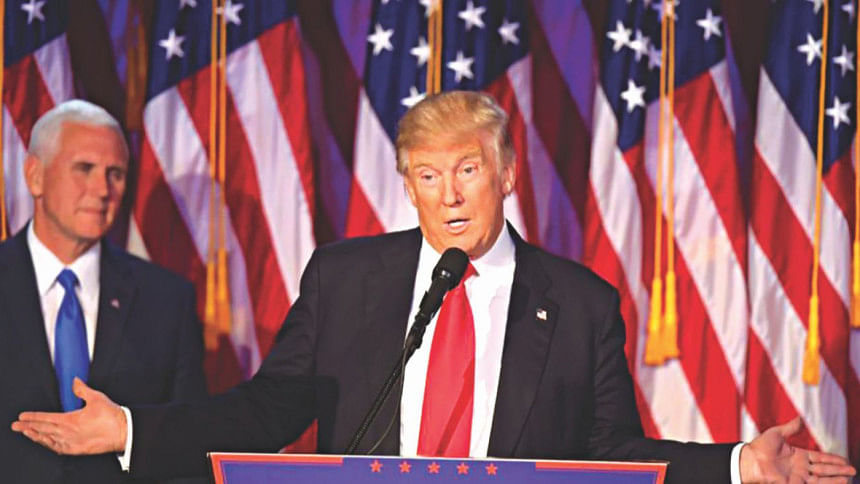Donald Trump's flawed South Asia policy

Donald Trump on August 21, 2017, by laying out America's path forward for Afghanistan and South Asia, has re-entered the new Great Game—reminiscent of the 19th century rivalry between Britain and Russia.
Commander-in-Chief Trump arrived at three fundamental conclusions about America's core interests in Afghanistan. First, he wants to have an honourable and enduring outcome—i.e. win the war. Second, he reversed his earlier position to withdraw troops from Afghanistan. US troops will remain based on conditions on the ground and as long as necessary. Third, Trump accused Pakistan of giving safe haven to terrorists. He warned Pakistan that its partnership with the US cannot survive if Pakistan continues to harbour terrorists. He declared America was developing its strategic partnership further with India and wants Delhi to be more forthcoming in Afghan affairs. What was most outrageous was when Trump said, "We are not nation-building again. We are killing terrorists".
Afghanistan is known as the "Graveyard of Empires". Taliban spokesman Zabiullah Mujahid said, "If America doesn't withdraw its troops from Afghanistan, soon Afghanistan will become another graveyard for this superpower", indicating a surge in attacks. Taliban, fattened by money from smuggling opium is well-armed and better organised. It is less corrupt and enjoys loyalty in the countryside, controlling over 40 percent of the territory.
Afghan President Ashraf Ghani is pleased at Trump's strategy and happy that fresh American troops were coming again. But Ghani and CEO Abdullah Abdullah, elected through a fraudulent election, runs a kleptocracy unable to give moral leadership to the 190,000 demoralised individuals of the Afghan National Security Force. Afghanistan is not a democracy by any definition—it is a tribal society with allegiance to the tribal chiefs—not to Ashraf Ghani in Kabul.
US has always toyed with the idea of resolving Afghan crisis without Pakistan. To put pressure on Islamabad, which is a non-Nato US ally, Defence Secretary Mattis cancelled USD 350 million of USD 900 million military aid to Pakistan in 2017. Pakistan does not seem worried as its relationship with China is now worth USD 110 billion—with the China Pakistan Economic Corridor (CPEC) bringing in USD 4 billion in 2017.
The Pakistani government, politicians and media reacted strongly to Trump's plan. Pakistan Foreign Ministry described Trump's allegation as "a false narrative". It said a military solution is not possible and only an Afghan-owned politically negotiated solution can lead to peace in Afghanistan. Pakistan Foreign Minister Khawaja Asif briefed the Senate on August 24 that the high-level meeting attended by PM Shahid Khaqan Abbasi and all the service chiefs strongly rejected Trump's accusations. Islamabad is peeved that US wants to develop a partnership with arch-rival India.
Pakistan is no doubt guilty for raising the Taliban and other outfits that have spread terror both in Afghanistan and India. The Taliban has kept Pakistan's rival India at bay in Afghanistan. Pakistan will no doubt continue to support the Taliban until it gets a compliant government in Kabul. With the current face-off with India over Kashmir, Islamabad feels deeply insecure and sees Afghanistan as its strategic depth. Pakistan's security concerns are linked with Afghanistan.
To Delhi, which always accuses Pakistan of providing safe havens to militants, Trump lambasting Pakistan sounded sweet. Indian MEA statement welcomed Trump's Afghan plan. Trump said that India was a "critical part of the South Asia strategy". This partnership is the outcome of Narendra Modi's visit to Washington in June 2017. Did Trump's overtures to India strengthen Delhi's position to end the Doklam stand-off with China?
The triangular narrative of relations among Pakistan, Afghanistan and India is extremely complex. Trump cannot resolve the Afghan crisis with Indian assistance alone, excluding Pakistan. On the contrary, it will raise tension in the subcontinent. However, India should not be overtly happy that Trump has castigated Pakistan. Surely, Delhi will not relish Afghanistan having a common border with India and Taliban knocking at India's gate. For Delhi, fighting militants in Kashmir, Pakistan is a buffer between India and terrorist-infested Afghanistan. But India has given in to the old adage—my enemy's (Pakistan) enemy (Afghanistan) is my friend.
Fighting over 16 years, spending over USD 1 trillion and even after losing 2,400 troops there is no sight of victory for America in Afghanistan. Trump's 4,000 additional troops, in addition to the 8,500 already there, will hardly change the military balance in Afghanistan. In 2010 Nato-led troops numbered 140,000 but could not secure the country from the Taliban.
US pressures on Pakistan will undoubtedly push Pakistan closer to China, Russia and Iran—regional players in the new Great Game. Chinese Foreign Minister Wang Yi on August 22 reaffirmed China's support to Pakistan asserting that Pakistan was on the front line in the struggle against terrorism and had made "great sacrifices" and "important contributions" in the fight.
Russia lately has been normalising relations with Pakistan, and according to some unconfirmed reports, is in communication with Taliban, supplying arms. A reversal of the Afghan war-game is not unlikely—Russia fuelling Taliban to ensure an Americans defeat in Afghanistan, as America did with the Mujahedeen to oust Russia in the 1980s. Shiite Iran, under pressure from America over its nuclear deal, has maintained communication links with Sunni Taliban. Tehran may assist the Taliban to get rid of the common enemy America from its backyard. On the other side of the Game— it will be US and India with probably token representation from some US allies.
Donald Trump said he studied Afghanistan in great detail. But Pakistan Tehreeq-e-Insaf (PTI) Chief Imran Khan commented that Trump had no understanding of South Asia. Trump blames Pakistan for America's deeply flawed and failed Afghan policy.
Trump's plan is flawed with no clear objective. He mentioned a political settlement with the Taliban—he should embark upon this path and try to find a negotiated settlement for Afghanistan rather than counting body-bags. America should also make sure that tensions between Pakistan and India do not spiral into a catastrophic nuclear conflict.
Mahmood Hasan is former Ambassador and Secretary.





Comments